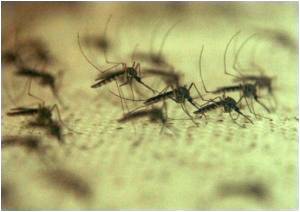
Officials at the WHO say Asia, home to 70 percent of the at-risk population, has seen a rise in dengue mainly because of higher temperatures due to climate change, rising populations and greater international travel.
The organisation says "a rapid rise in urban mosquito populations" is also bringing ever greater numbers of people into contact with the virus.
According to data collected by the UN body, the highest number of reported cases in Asia this year to August are in Indonesia (80,065) followed by Thailand (57,948) and Sri Lanka (27,142).
Dengue, transmitted to humans by the female Aedes mosquitoes, causes a severe flu-like illness for most victims that lasts about a week. There are four strains, one of which is a potentially lethal haemorrhagic type.
"The disease has spread fast. Dengue is appearing in new areas," said Yogesh Choudhri, an expert at the WHO on the Asia region, who said the disease had crossed new international borders and spread within countries.
Advertisement
In India, government hospitals in New Delhi are overflowing with dengue victims as the city hosts 7,000 foreign athletes and officials for the Commonwealth Games, which finish next Thursday.
Advertisement
The number of actual infections is likely to be far higher.
He blamed the delayed construction work for the Commonwealth Games for part of the problem in New Delhi, where monsoon rains have been at their strongest in years.
"Delays in Games construction and urban improvement projects are to blame for the severe dengue outbreak since mounds of rubble and puddles are strewn across the city," he said.
Last week an official with the Indian lawn bowls squad contracted dengue, the first person associated with the Games to to do so.
There is no known treatment for dengue, but several preventative steps can be taken.
The most important is to ensure there is no standing water near residential areas where mosquitoes breed.
Spraying insecticide, an approach taken by many city authorities, can also help, as does applying mosquito repellent and wearing long sleeves and trousers.
In Thailand, the government is worried about a South Korean-inspired fashion craze for black leggings which could be putting teenagers at risk.
"I'm worried about how people dress, especially teenagers," said Deputy Public Health Minister Phansiri Kulanartsiri, noting that the mosquitoes which transmit the disease are attracted by dark colours.
"The mosquitoes can bite through the leggings' thin fabric, so those who wear them are at greater risk of being infected with dengue."
In Sri Lanka, authorities have introduced heavy fines for people with standing water in their homes, and troops have been deployed to clean up public places.
Malaysia has reported a 53-percent rise in dengue-related deaths this year, but backed away from a controversial trial of releasing genetically modified mosquitoes to wipe out the disease.
In the first experiment of its kind in Asia, 2,000-3,000 modified male Aedes aegypti mosquitoes were to have been released in two Malaysian states in October or November.
The offspring of the mosquitoes would have died quickly, curbing the growth of the population in a technique researchers hope could eventually eradicate the dengue mosquito altogether.
But the government scrapped the idea after complaints from environmentalists.
Health authorities in Bangladesh said dengue prevalence was on the rise but fatalities were down.
Surveys conducted by the health ministry indicate that the dengue prevalence rate was 3.4 percent in 2006, rising to 5.25 percent in 2007, and by 2009 to 9.1 percent.
The number of dengue fever patients in South Korea and Japan remains small but is rising as more travel overseas, especially to Southeast Asia and Latin America.
Source-AFP














